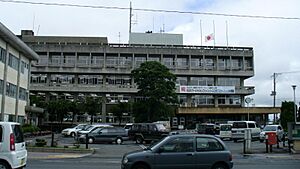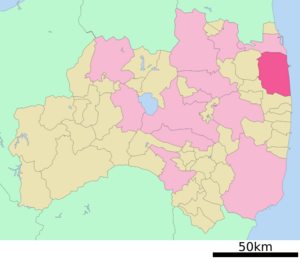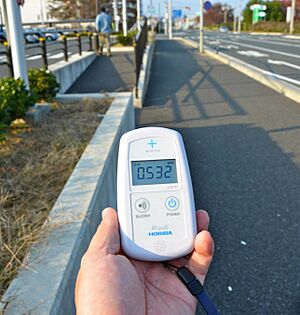Minamisōma facts for kids
Quick facts for kids
Minamisōma
南相馬市
|
|||
|---|---|---|---|

Minamisōma City Hall
|
|||
|
|||

Location of Minamisōmain Fukushima Prefecture
|
|||
| Country | Japan | ||
| Region | Tōhoku | ||
| Prefecture | Fukushima | ||
| Area | |||
| • Total | 398.58 km2 (153.89 sq mi) | ||
| Population
(October 10, 2020)
|
|||
| • Total | 59,005 | ||
| • Density | 148.0380/km2 (383.417/sq mi) | ||
| Time zone | UTC+9 (Japan Standard Time) | ||
| - Tree | Japanese Zelkova | ||
| - Flower | Sakura | ||
| - Bird | Skylark | ||
| - Fish | Salmon | ||
| - Insect | Firefly | ||
| Address | 2-27 Motomachi, Haramachi-ku, Minamisōma-shi, Fukushima-ken 975-8686 | ||
Minamisōma (南相馬市, Minamisōma-shi) is a city located in Fukushima Prefecture, Japan. As of March 1, 2020, about 53,462 people lived there in 26,355 homes. The city covers an area of about 398.58 square kilometers.
Contents
Geography and Climate
Minamisōma is in the northeastern part of Fukushima Prefecture. To the east, it has the Pacific Ocean. To the west, it has the Abukuma Plateau, which is a hilly area.
Nearby Cities and Towns
Minamisōma is close to these places in Fukushima Prefecture:
Weather in Minamisōma
Minamisōma has a humid climate. This means it has warm, wet summers and mild winters. The average temperature each year is about 12.4 degrees Celsius. September is usually the wettest month. The hottest month is August, with temperatures around 24.7 degrees Celsius. January is the coldest month, with temperatures around 1.7 degrees Celsius.
Population Changes Over Time
The number of people living in Minamisōma was highest in the 1950s. Here is how the population has changed over the years:
| Historical population | ||
|---|---|---|
| Year | Pop. | ±% |
| 1920 | 51,903 | — |
| 1930 | 58,470 | +12.7% |
| 1940 | 60,693 | +3.8% |
| 1950 | 80,004 | +31.8% |
| 1960 | 75,299 | −5.9% |
| 1970 | 69,105 | −8.2% |
| 1980 | 74,296 | +7.5% |
| 1990 | 77,253 | +4.0% |
| 2000 | 75,246 | −2.6% |
| 2010 | 70,878 | −5.8% |
| 2020 | 59,005 | −16.8% |
History of Minamisōma
The area where Minamisōma is today has been lived in for a very long time. People lived here even during the Jōmon period, which was thousands of years ago. Many old tombs from the Kofun period have been found here.
During the Edo period (1603-1868), this area was part of a large land owned by the Sōma family. After a big change in Japan called the Meiji Restoration in 1868, the area became part of a new province.
On April 1, 1896, the area was organized into different towns and villages. One of these was the town of Hara, which became a city called Haramachi on March 20, 1954. The city of Minamisōma was created on January 1, 2006. It was formed by combining Haramachi with two other towns, Kashima and Odaka.
The 2011 Earthquake and Tsunami
On March 11, 2011, a very strong earthquake hit Japan. This caused a huge tsunami (a giant ocean wave) that reached Minamisōma. The city was partly covered by the tsunami and was badly damaged. Many people were sadly lost or went missing.
Minamisōma is about 25 kilometers (15 miles) north of the Fukushima I Nuclear Power Plant. After the earthquake, there was a nuclear accident at this power plant. Because of this, most people in Minamisōma had to leave their homes. This was because much of the city was inside a special zone where people were told to evacuate for safety.
In March 2012, the city was divided into three areas based on safety levels. In some areas, people could visit but not stay overnight. In others, visits were limited. In the most affected areas, no one was allowed to enter because of higher radiation levels.
On April 15, 2012, some people were allowed to return to their homes. The evacuation zone was made smaller. However, parts of the city still had damage, and many services like electricity and water were not working yet. Schools and hospitals also stayed closed for a while.
By July 12, 2016, almost everyone was allowed to return home, except for a very small area near the border with Namie. In August of the same year, elementary and junior high schools in Minamisōma were able to open again after being closed since 2011.
Education
Minamisōma has many schools for children and teenagers:
- 16 public elementary schools
- 6 public junior high schools
- 4 public high schools
These schools are managed by the city government and the Fukushima Prefectural Board of Education.
Economy
One important part of Minamisōma's economy is the Tohoku Electric's Haramachi Thermal Power Station. This power station helps produce electricity.
Transportation
Trains
![]() East Japan Railway Company (JR East) - Jōban Line You can travel by train on the Jōban Line, with stations in Minamisōma:
East Japan Railway Company (JR East) - Jōban Line You can travel by train on the Jōban Line, with stations in Minamisōma:
- Momouchi
- Odaka
- Iwaki-Ota
- Haranomachi
- Kashima
Highways
Major roads that pass through Minamisōma include:
 Jōban Expressway - This expressway has the Minamisoma Interchange and the Minamisoma-Kashima Service Area.
Jōban Expressway - This expressway has the Minamisoma Interchange and the Minamisoma-Kashima Service Area. National Route 6
National Route 6 National Route 114
National Route 114
Sister City
Minamisōma has a special connection with a city in the United States:
Places to Visit
Minamisōma has interesting historical sites:
- Ruins of Odaka Castle
National Historic Sites
These are important historical places protected by the government:
- Hayama Cave Tomb
- Urajiri Shell Mound
- Yokodaidō Steel Production Site
- Sakurai Kofun
- Daihisan Stone Buddhas
- Mano Kofun Cluster
- Izumi Kanga ruins
See also
 In Spanish: Minamisōma (Fukushima) para niños
In Spanish: Minamisōma (Fukushima) para niños
 | Emma Amos |
 | Edward Mitchell Bannister |
 | Larry D. Alexander |
 | Ernie Barnes |





